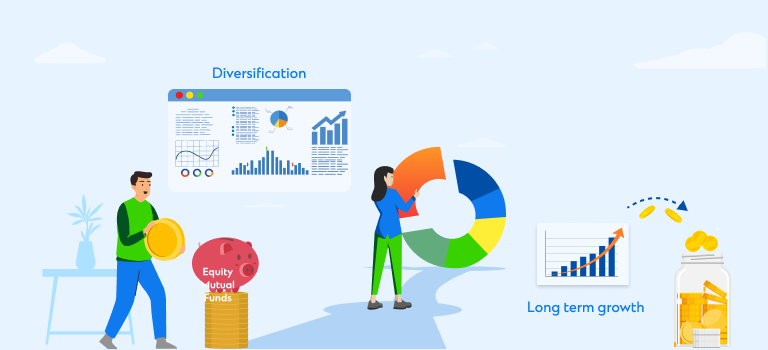

Table of Contents
Every service these days has two options – do it yourself or trust an expert to do it for you. In the world of investments, the equivalent of this is direct investment in stock markets versus investing through the mutual funds route. However, which one is best suited for an investor? Read on to find out.
Horses for courses
Doctor can understand their own ailments and can treat themselves. Plumbers can fix water leaks at their own houses and carpenters can easily make wooden articles for themselves. Similarly, skilled finance professionals understand stock markets better to make winning trades and investments. All of us want to try (or have tried) our hands at direct stock investing, but few of us really build a track record. Wealth creation through direct equity investing requires patience and skill. Choosing the right stock requires you to carefully study the company performance, the macro factors, watch out for news in the market, undertake technical and fundamental analysis – all of which require skill, time and effort. The average investor would be unlikely to have either.
Mutual funds adopt a different approach. The investor transfers the money to be invested to the fund-house, and the fund manager invests and monitors everything related to investments. With professional degrees, experience and a constant learning ecosystem around them, mutual fund experts can be pretty successful in generating returns on behalf of investors. Over the long term, many mutual funds have given superior returns annually. Apply now to invest in mutual funds with SC Invest. Hence, mutual funds appear as a good solution for most people who don’t have time and skill at their disposal.
Value of time
For the successful direct stock investor, a 20 percent return annually may look small. This is because the stock market can give you multifold returns in a year if things go your way. But the probability of making superlative returns is minuscule and is also accompanied by the risk of booking losses en route. Trading in stocks requires an understanding of how the stock market works, how trades happen during specified market hours and lots of time.
In mutual funds, all of this is taken care of by the fund manager. Moreover, the fund manager doesn’t invest your money in one or two stocks. They build a portfolio of over 20-50 stocks. This lowers the risk of investing, which means that the impact from the decline in a single stock is reduced. With a Systematic Investment Plan, which allows you to invest regularly, mutual fund plans will give you the benefit of rupee cost averaging and compound your investment over a 5 to 10 year period. All of this happens in a mutual fund with the investor spending only a few minutesto do the transaction, and there is no need to be a trading expert. Click here to learn about the many benefits of SIP.
Market insights
If you need incisive and actionable market insights, Standard Chartered’s market views can be accessed on-the-go. You can put this information to use for any of your investing needs. However, if you have a busy work-life, it may be better for you to start your investment journey through our online mutual funds^ platform. Once you gain some confidence as an MF investor, you can always open a 3-in-1 account** later to start learning the ropes of direct equity investments.
As a beginner, mutual funds are a better bet if you wish to partake in the stock market but do not have the time and expertise to pick and choose individual stocks. You can use online mutual fund^ platform to get fund ideas, and smoothly conduct the transaction as and when you want.
Mutual Funds or Stocks FAQs
1. How does portfolio diversification differ between mutual funds and direct equity investments?
Mutual funds inherently offer diversification across sectors and asset classes, reducing exposure to individual stock volatility. Direct equity investment require strategic selection to achieve similar balance, demanding deeper market insight and active management.
2. What liquidity considerations arise when choosing between mutual funds and stocks?
Mutual funds typically allow redemptions within a few business days, though exit loads may apply for early withdrawals. Stocks offer high liquidity in active markets, but selling less-traded shares can be slower, impacting portfolio flexibility.
3. How do market cycles influence the performance of mutual funds versus individual stocks?
Mutual funds , with their diversified holdings, often smooth out volatility across market cycles. Individual stocks may experience sharper fluctuations, offering opportunities for significant gains or losses depending on sector-specific trends
4. Can a blended approach of mutual funds and stocks optimise wealth creation?
Combining mutual funds for stability and stocks for targeted growth can align with a sophisticated investor’s goals. This strategy leverages professional management while allowing selective exposure to high-potential equities.
5. How does currency fluctuation impact international mutual funds compared to global stocks?
International mutual funds hedge currency risks through diversified holdings, stabilising returns. Direct global stock investments expose investors to currency volatility, requiring careful consideration of exchange rate movements.
6. What role does investor discipline play in managing mutual funds versus stocks?
Mutual funds, managed by professionals, require less daily oversight, supporting disciplined long-term investing. Stocks demand rigorous monitoring and emotional restraint to navigate market swings effectively.
7. How can Standard Chartered’s 3-in-1 account enhance investment efficiency?
A 3-in-1 account integrates banking, demat, and trading, enabling seamless transitions between mutual funds and stocks. This streamlines portfolio management for investors seeking efficiency and flexibility.
8. What are the benefits of aligning investments with personal financial objectives?
Getting mutual fund and stock selections to specific goals, such as wealth preservation or aggressive growth ensures alignment with risk appetite and timelines, enhancing overall portfolio performance.



